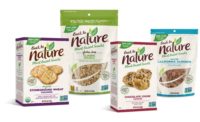By: Michelle Burnett
There’s a world of change taking place among consumer habits.
The population is becoming increasingly conscious of ingredients in the foods they consume, along with the environmental impact their dietary choices can have on the planet and its future.
Studies suggest Gen Z and Millennials are most likely to become vegan, vegetarian, or incorporate more plant-based foods into their daily lifestyle than any other generation. This can be for varying reasons, including environmental, animal rights, and an increasingly health- conscious society - who is becoming more informed on the impacts diet and lifestyle have on their bodies and quality of life. This connects with a high demand for clean label products, as consumers are more aware than ever when it comes to the food they consume, they want ingredients they can pronounce. Not only do they want to feel healthy, they want to feel good about their choices and the impact on the world and environment around them.
Plant-based diets differ from vegan diets in many key ways. Vegans fully abstain from all animal derived products, whereas plant-based diets are known to be much less restrictive, focusing on increasing daily fruit and vegetable intake. They are looking to minimize meat and dairy intake, without necessarily removing those products all together. Plant-based diets tend to be more appealing to today's consumer because there's room for much more flexibility.
The pandemic lockdown, which began in 2020, is seen as a driving factor in the population's current focus on health and nutrition. Many have struggled with weight gain during this time and are now evaluating how to reverse these changes. Having undergone nationwide lockdowns, many are beginning to reassess their lifestyles—a priority for many being health and wellness.
This new focus has led to an increased popularity in plant-based alternatives. The correlation between health and fitness and plant-based products is that plant-based products do not have cholesterol, hormones, or animal fat in them—all common attributes in cow's milk. Plant based diets also tend to be higher in fiber—animal products don’t contain fiber, whereas many plant proteins do. According to research conducted by Medical News Today, a plant-based diet reduces rick of heart disease death by 40 percent.
Many are making the decision to incorporate more plant-based alternatives to their diet to feel they’re making choices that will have less global impact. The London Free Press announced a 113 percent increase in plant-based and vegan-related internet searches in Canada between 2016 and 2020. The PCRM estimates that a global shift to a plant-based diet could reduce mortality and greenhouse gases caused by food production by 10 percent and 70 percent by 2050. Plant based options are seen as purchases the consumer can feel good about.
In 2022, 1 in 5 Canadians who regularly eat meat would like to reduce the amount of meat they consume (that’s 22 percent of the Canadian population). The truth is, many people are looking to make small and impactful decisions when it comes to their food and lifestyle choices. Most are not looking to give up their entire lifestyle, but instead, incorporate more plant-based options within their existing diet, to add more variety to their eating habits, and feel good about the small choices they’re making every day.
Perhaps the most palatable way of incorporating plant-based alternatives into a diet is through pastries and baked goods. Many consumers are not looking to replace their beloved steaks and beef burgers, so pastries are a fantastic way to go. Baked goods are known to be easily substitutable for plant-based alternatives. This is because plant-based dairies and egg mixtures are far easier to mimic or substitute, while maintaining the expected taste, when compared to many meat alternatives.
Embassy Ingredients Ltd. offers a wide range of plant-based mixes for all your favorite baked goods and sweet treats. Embassy’s Plant-E-Full line includes a variety of plant-based mixes to choose from including brownies, blondies, cookies, cream cakes, scones, and brioche base.
No matter what your consumers are craving, they have plant-based mixes to meet any mood—or taste for positive change.




